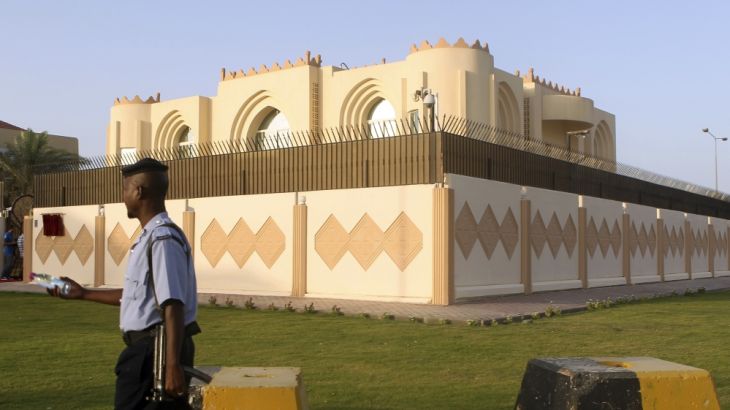Otaiba emails: UAE lobbied US to host Taliban office
Leaked emails show Emirati diplomats calling on US to choose Abu Dhabi over Doha for Afghan group’s unofficial embassy.

The UAE lobbied US officials to be able to host an office for the Taliban in Abu Dhabi – a milestone that eventually went to Qatar, according to a series of leaked emails from the UAE ambassador to the United States.
Reported by the New York Times, the emails from Yousef al-Otaiba apparently contradict a mounted campaign against Qatar for its alleged support of “terrorist groups”.
Keep reading
list of 4 itemsPhotos: Tourist numbers up in post-war Afghanistan
Taliban ban on girls’ education defies both worldly and religious logic
Afghanistan calls for ‘respect’ after Cricket Australia snub
As part of its attempt to isolate the peninsula, a Saudi-led bloc including the UAE, Bahrain and Egypt has derided Qatar for hosting an office for the Afghan armed group.
The office, which opened in June 2013, was part of a broader US-led effort to facilitate peace talks in Afghanistan – not to support their ideology or the group itself.
The New York Times reported on Monday that Otaiba, the Emirati ambassador to Washington, had received an “angry call” from UAE Foreign Minister Abdullah bin Zayed Al Nahyan, complaining that the Taliban had ended up in Qatar and not the UAE, according to messages in the ambassador’s Hotmail account.
“I got an angry call from [Zayed] saying how come we weren’t told,” Otaiba wrote to an American official, referring to the decision on choosing Qatar to host the Taliban.
The newspaper obtained another email dated September 12, 2011, in which an Emirati official questioned the US position on the Taliban office’s location
READ MORE: Yousef al-Otaiba linked to Malaysia 1MBD scandal – WSJ
“There is an article in the London Times that mentions US is backing setting up a Taliban embassy in Doha,” the diplomat, Mohamed Mahmoud al-Khaja, wrote to Jeffrey Feltman, then assistant secretary of state for Near East affairs.
“HH says that we were under the impression that Abu Dhabi was your first choice and this is what we were informed”, Khaja said in the email, referring to bin Zayed.
The latest email leak comes from a group called “GlobalLeaks”, which is not affiliated with the software developer, GlobaLeaks.
GlobalLeaks told Newsweek that the recent messages are proof of the “biggest hypocrisy” in the Qatar crisis.
Controversial move
Qatar agreed to open the mission for the Taliban with Washington’s blessing four years ago.
In 2011, when the emails were sent, the Obama administration was making efforts to hold peace talks between the Taliban and the Afghan government, as it sought to remove NATO troops from the country.
Most of the troops withdrew in 2014, but peace was not achieved.
The opening of the office enraged the Afghan president at the time, Hamid Karzai, by styling itself as an unofficial embassy for a government-in-exile.
Karzai broke off bilateral talks with the Americans and threatened to boycott any peace process altogether after the Taliban opened the offices with a flag-raising ceremony for the “Islamic Emirate of Afghanistan” – the name of the country under Taliban rule.
That flag has since been removed.
‘Qatar’s behaviour’
Otaiba has repeatedly criticised Qatar for its alleged alliance with the Muslim Brotherhood and over the opening of another Doha-based office for the Palestinian group Hamas, which was also arranged with US approval.
“What is true is Qatar’s behaviour. Funding, supporting, and enabling extremists from the Taliban to Hamas & Qadafi,” Otaiba wrote in a tweet on July 17, referring to the late former Libyan leader, Muammar Gaddafi.
Doha strongly denies all allegations by the Saudi-led bloc as baseless.
Neither the UAE embassy nor the US state department has responded to Otaiba’s leaked emails.
Earlier this month, David Petraeus, former CIA chief and army general, said: “Our partners should remember that Qatar – at our request – welcomed delegations from the Taliban and Hamas”.
READ MORE: Qatar-Gulf crisis – All the latest updates
Last week, the Saudi-led bloc gave Qatar 10 days to comply with 13 demands to end the major diplomatic crisis in the Gulf, insisting, among other things, that Doha shut down Al Jazeera, close a Turkish military base and scale down ties with Iran.
Qatar National Human Rights Committee (NHRC) called on Doha not to accept a list of demands submitted by four Arab countries, stating that it contains conditions that violate human rights conventions and other international and regional agreements.